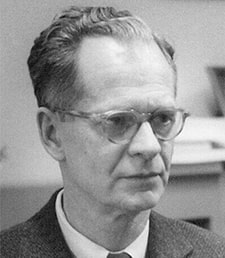Burrhus Frederic Skinner (1904 – 1990) was a celebrated American psychologist who heavily influenced the field of behaviorism. His work focused on the study of human behavior and how it is influenced by environmental stimuli. This approach has proven to be a powerful tool for understanding human behavior.
Skinner attended Hamilton College in New York with the intention of becoming a writer. He found himself at a social disadvantage at the college because he had a high IQ. He was a member of a fraternity. He wrote for the school paper as an atheist, but was critical of the traditional mores of his college.
After receiving his Bachelor of Arts in English literature in 1926, he attended Harvard University, where he would later research and teach. Fred Keller convinced Skinner that he could make a scientific study of behavior, which Skinner subsequently did at Harvard. This led Skinner to develop a prototype for the “Skinner box” and to work with Keller to create other tools for small experiments.
After graduating from college, Skinner unsuccessfully tried to write a novel while he lived with his parents. This period he later called the ” Dark Years “. He became disillusioned with his literary skills despite encouragement from the renowned poet Robert Frost, concluding that he lacked world experience and lacked a personal perspective from which to write. After meeting John B. Watson’s behaviorism, he decided to pursue graduate study in psychology and develop his own version of behaviorism.
Skinner was attracted to psychology through the work of the Russian physiologist Ivan Petrovich Pavlov on conditioned reflexes, articles on behaviorism by Bertrand Russell, and the ideas of John B. Watson, the founder of behaviorism. After receiving his Ph.D. from Harvard University (1931), he remained there as a researcher until 1936, when he joined the faculty of the University of Minnesota, Minneapolis, where he wrote The Behavior of Organisms (1938).
As a professor at Indiana University, Bloomington, Skinner gained some measure of public attention through his invention of the Air Crib baby tender—a large, soundproof, mechanically- cooled, air-conditioned box designed to provide an optimal environment for child growth during the first two years.
In 1948, one of his most controversial works, Walden Two, was published, a novel about life in a utopian community based on his own principles of social engineering.
As a professor of psychology at Harvard University for over forty years, Skinner had a significant impact on the field. He employed various types of experimental equipment to train laboratory animals to carry out complex and exceptional actions. An impressive example of his intelligence was his pigeons who learned how to play table tennis. One of Skinner’s most well-known inventions, the Skinner box, has been widely used in pharmaceutical research to observe how drugs may affect animal behavior.
Skinner was a prolific author, writing books on a wide range of topics. He wrote 21 books and 180 articles, including Science and Human Behavior and Verbal Behavior. He was also known for his work on behaviorism, which is the study of how behavior is influenced by the environment. Holland was a Dutch psychologist and author who published works on teaching and psychology in the 1960s.
He also authored a book on the technology of teaching. Beyond Freedom and Dignity (1971) is a book that generated controversy for its argument that concepts of freedom and dignity can lead to self-destruction. The book advanced the cause of a technology that could be compared to the physical and biological sciences. Skinner published an autobiography in three parts: Particulars of My Life (1976), The Shaping of a Behaviorist (1979), and A Matter of Consequences (1983). The year before his death, a book entitled “Recent Issues in the Analysis of Behavior” was published.
Skinner’s public exposure had increased in the 1970s, he remained active even after his retirement in 1974, until his death. In 1989, Skinner was diagnosed with leukemia and passed away on August 18, 1990. Ten days before his death, he was given the lifetime achievement award by the American Psychological Association and gave a speech concerning his work in psychology.


